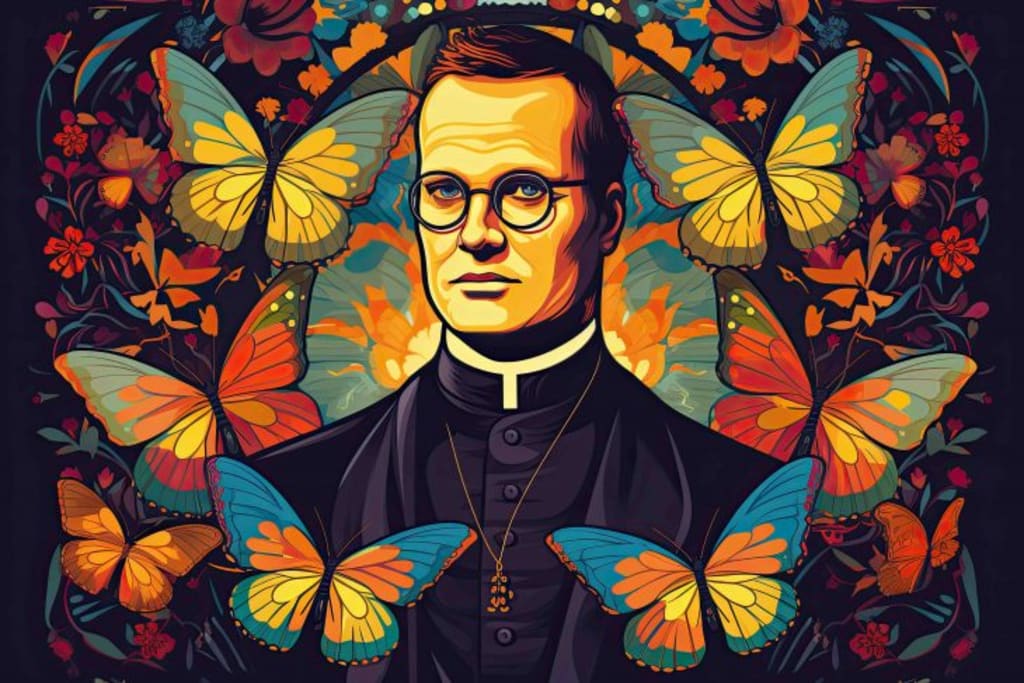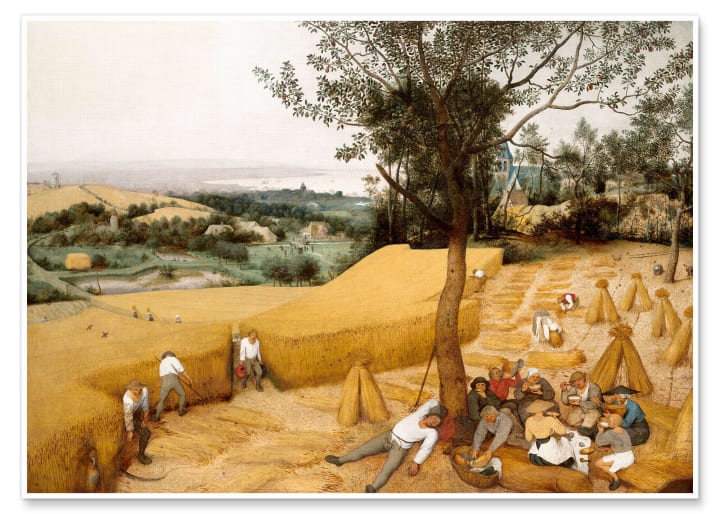Height, Shape, Color, Position
A very famous gardener, his peas, and the immutable bureaucracy that keeps them apart.

HEIGHT, SHAPE, COLOR, POSITION
LOGLINE:
A very famous gardener, his peas, and the immutable bureaucracy that keeps them apart.
"Height, Shape, Color, Position" is a deeply funny, deeply human comedy about the forces we allow to keep us away from our dreams.
CHARACTER BREAKDOWN:
GREGOR MENDEL, ABBOT - Now in his mid-60s, Abbot Gregor Mendel spends more time preparing an arcane legal case relating to the taxation of monasteries than studying the hereditary principles of pea plants. COMEDIC FOIBLE: he is intensely derisive of the average villager despite the seriousness with which he takes his pastoral duties.
JOHANN JINGLEHEIMER SCHMIDT - A young novice recently appointed Mendel's secretary, Johann J. Schmidt is at first skeptical of his master. He finds a new respect for Mendel when he stumbles upon Mendel's scientific work. COMEDIC FOIBLE: he is ingenuous, sincere, effective, and obtuse. The world has not broken him.
MARIA VON MARIA - A mysterious young woman works as the gardener for a monastery through which Mendel and Schmidt pass on their journey. She possesses a mysterious pea plant and is super proud of it. COMEDIC FOIBLE: her genius goes unrecognized by her hyperbolically patriarchal community.
ANTON MENDEL - Gregor's father, Anton Mendel, was a big, strong farmer with little patience for his son's eggheaded tendencies. COMEDIC FOIBLE: he's mean.
JUDGE PINCHAS MOZART - an imposing representative of the Austro-Hungarian bureaucracy. Mozart has Javert-like respect for the law and only rarely does his quirky, non-sequitur sense of humor peek through. COMEDIC FOIBLE: he publically despises his namesake but, privately, is a composer in his own right.
Other villagers, priests, scientists, etc.
SETTING:
The beautiful Moravian countryside during the 1860s (flashbacks in the 1830s).

Moravia is a landscape of rolling hills, tumbling brooks, droning bumblebees, verdure that is fecund to the point of orgasm, and peasants. Not many scientists.
Gregor Mendel, son of an illiterate farmer, was made abbot of a prominent monastery just a few years ago. Despite his rags-to-riches success story, Mendel is riddled with anxiety, agoraphobia, and self-loathing. His love for humanity is occluded by a deep misanthrope reinforced by years of Kafka-esque experiences with the government. His love for the hustle and bustle of city life is veiled by a fear of leaving the monastery grounds. And, worst of all, his passion for the Pisum sativum (the common pea) is rendered a cruel (and secret) joke by failure and regret.
Mendel and his 18-year-old secretary Johann Jingleheimer Schmidt are on foot. Their carriage broke down in a sudden rainstorm a few miles back, and they might be late if they don't hustle --- late for the most important event of Mendel's life.
The provincial court has finally agreed to hear his petition. The last decade of the abbot's life has been consumed by the legal minutiae of this case (an attempt to exempt his monastery from taxation), and as a consequence, he has totally given up all dreams of convincing the science community of his groundbreaking word done on genetic inheritance.
By a stroke of fortune, Mendel and Schmidt's journey takes them through the grounds of a strange monastery garden, tended by a brilliant young gardener who is aware of Mendel and his work on the properties of hereditary information transference.
Mendel is stopped in his tracks by something curious, something he never expected to see, something that at once resuscitates his love for peas and challenges everything he thought he knew about them:
A rainbow pea plant.
OUTLINE of EPISODE ONE (PILOT)
Episodes are ~30 minutes, except pilot which is ~40 minutes.
SCENE ONE (cold open) -
A young man lazes on a pile of hay in a barn. It's autumn in Moravia and the leaves are falling. Other men on the farm are hard at work harvesting crops, but this guy is too cozy where he is.
A silhouette enters the doorway. It moves into the shadows of the barn. As our eyes adjust, we see that it is a charming young woman. She falls down into the hay next to the man. They begin to make love while the pigs and donkeys watch languidly.
SCENE TWO (cold open) -
A sperm, one among many, traverses a perilous route through multiple dark tunnels. It has but one mission: get to the finish line. It can hear the dull, brutish noises of what sounds like a fight happening somewhere outside the tunnels. Surviving the many perils of the journey, it finally arrives at its destination.
TITLES - a stylized depiction of a Y chromosome interacting with an X chromosome to produce a short, lumpy, pale botanist --- our short, lumpy, pale botanist.
SCENE THREE -
Decades later, Gregor Johann Mendel, on the last day of his life, stands stock-still on a country path that cuts through the garden of a small church. He supports himself with a cane. He appears transfixed. He's staring intently at something that we can't see. A memory? A ghost?
Johann, his 18-year-old secretary, attempts to direct his attention to the long-awaited meeting with Judge Mozart, but Abbot Mendel is distractable and entranced. He's been having these episodes more and more in recent weeks. Johann finds joy in tormenting his monomaniacal master.
New characters are introduced with stylized Latin Linnaean taxonomy and freeze-frames.
SCENE FOUR -
Judge Pinchas Mozart impatiently awaits the abbot.
SCENE FIVE -
Mendel, in the garden of the monastery through which they are passing, discovers a pea plant with rainbow-colored flowers. He and Johann speculate about how this could be so. Maria von Maria, an orphan who was raised by the monastery and is now the gardener, is introduced.
SCENE SIX -
Despite the fact that they are already late for the hearing, Mendel and Johann stay with Maria to observe her marvelous scientific work. She still refuses, though, to explain the rainbow peas. It is clear that she is aware of Mendel's groundbreaking work, but won't reveal how.
SCENE SEVEN -
Intrusive flashback. Abbot Mendel is tormented by his cruel father, Anton. True flashback, Mendel, a young Augustinian friar, is chatting with the then-abbot, who asks him to tend to the garden. Mendel asks what should be planted in the new patch. The abbot thinks for a while and then says, "artichokes."
PARALLEL NARRATIVE:
A voiceover narrator explains that this is the last day of Mendel's life, a day when he makes a long-awaited discovery but won't have the time to share this discovery with the world. The narrator provides running commentary on the episode, from the perspective of a modern-day computer scientist working on a biography of Mendel, the originator (he sees it) of "information theory."
As the show progresses, the narrator gains storylines of his own.
SAMPLE (SCENE THREE)
An old abbot is marching swiftly down the high road through the gorgeous Moravian countryside. It's summer. A whiny, very un-majestic voice speaks to us over the scene.
VOICEOVER - I always wanted to write a biography. I don't know why. I think I wanted to disappear into someone else so completely that their life began to feel more real than mine. But whose life would I choose? Richard Feynman, the great American physicist? Oppenheimer, the destroyer of worlds? Marie Curie, who won the Nobel Prize in both physics and chemistry? No, I thought. I can shoot higher than that.
Abbot Gregor Mendel comes to a crest in the hill, wipes sweat off his brow, and spots a peasant lounging under a tree.
PEASANT Cup of water, father?
MENDEL Fuck off.
ENTER JOHANN, a novice of 18, carrying a bundle of papers. He's walking swiftly, trying to catch up, straightening the pages in his arms as if they had recently fallen.
The road takes them through the grounds of a monastery. Pea plants are growing in the garden. Mendel stops in his tracks.
MENDEL (to the pea plant) You again.
JOHANN Pardon?
MENDEL I didn’t say anything.
JOHANN Are you alright?
MENDEL Yes.
JOHANN You look pale. You look like you saw a ghost.
MENDEL Don’t be blasphemous.
JOHANN (approaches the peas) A ghost of...lima beans?
MENDEL Peas.
JOHANN Oh yeah, peas.
MENDEL How can you not tell the difference between a lima bean and a pea?
JOHANN I’m a novice. I am here only to learn.
MENDEL And address me as Abbott Mendel, please.
JOHANN Sorry.
MENDEL I’ve decided to be more strict about that.
JOHANN Sorry, Abbot Mendel.
MENDEL And by the way, if there’s such a thing as ghosts, why should only animals get to be ghosts? Why not plants?
JOHANN A plant ghost? Who ever heard of a plant ghost?
MENDEL Where is it written in the occult texts, ‘Johann Jingleheimer Smith's First Law of Ghosts states that only things with legs may become haunting specters when they die’?
JOHANN It's 'Schmidt,' Abbot Mendel, and besides, a pea plant can’t walk through walls.
MENDEL So a ghost is a thing that walks through walls?
JOHANN Definition 1, A ghost is incorporeal. Definition 2, A ghost walks. Definition 3, a wall is corporeal. Proposition 1, a ghost is a thing that walks through walls. Proof. Definitions 1 and 2. QED. It has been shown.
MENDEL You should be hanged for that.
JOHANN The wall is immaterial. It could be a thick hedge, or even a fence with narrowly-placed slats.
MENDEL The wall is important!
JOHANN The wall is immaterial. And besides, if bushes could walk, do you think a bush like this would spend its whole life in a monastery garden? With nothing to look at but a nasty little quadrant of the sun a few hours a day, some cobblestones, and its own children? It would lose its mind. [Walks on; pauses when Mendel doesn’t follow.] We’re going to be late, Abbot Mendel.
MENDEL Just a moment.
JOHANN I’m afraid we don’t have a moment sir.
MENDEL But this is remarkable. Look at this.
JOHANN Look at what?
MENDEL ‘Look at what, Abbott Mendel’.
JOHANN [approaches pea plant] Sir, the court is just a kilometer away. Even at the sluggish pace you set, we can get there in a few minutes. Sir, I think it would be a bad idea to be late.
MENDEL You don’t know what an idea is, Johann, let alone the difference between a good one and a bad one.
JOHANN What are you looking at, Abbot Mendel?
MENDEL This pea flower.
JOHANN Why?
MENDEL Look!
JOHANN I see it. So what?
MENDEL It’s rainbow-colored!
JOHANN So?
MENDEL What do you mean ‘so’? Pea flowers aren’t supposed to be rainbow-colored!
JOHANN How do you know?
MENDEL I know a lot about peas.
[End of Sample Scene]
About the Creator
Eric Dovigi
I am a writer and musician living in Arizona. I write about weird specific emotions I feel. I didn't like high school. I eat out too much. I stand 5'11" in basketball shoes.
Twitter: @DovigiEric






Comments (2)
This is really intriguing, very creative, and the "fuck off" line to the poor peasant made me snort out loud. There are so many directions for these characters and their peas to head in, and the nuances they carry bring so much color to this world. Love that the judge also dabbles in composing, too. This is dry and subtle and seems like a wild ride; I would definitely watch. Well done!
I really do want to watch this one. J. J. Schmidt...? That's my name, too! Whenever I go out, The people always...well, you know. Great concept here, and I think it is possible.